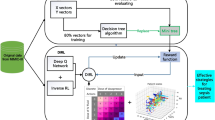Abstract
Sepsis is a leading cause of death in the ICU. It is a disease requiring complex interventions in a short period of time, but its optimal treatment strategy remains uncertain. Evidence suggests that the practices of currently used treatment strategies are problematic and may cause harm to patients. To address this decision problem, we propose a new medical decision model based on historical data to help clinicians recommend the best reference option for real-time treatment. Our model combines offline reinforcement learning and deep reinforcement learning to solve the problem of traditional reinforcement learning in the medical field due to the inability to interact with the environment, while enabling our model to make decisions in a continuous state-action space. We demonstrate that, on average, the treatments recommended by the model are more valuable and reliable than those recommended by clinicians. In a large validation dataset, we find out that the patients whose actual doses from clinicians matched the decisions made by AI has the lowest mortality rates. Our model provides personalized and clinically interpretable treatment decisions for sepsis to improve patient care.
Access this chapter
Tax calculation will be finalised at checkout
Purchases are for personal use only
Similar content being viewed by others
References
Singer, M., et al.: The third international consensus definitions for sepsis and septic shock (Sepsis-3). JAMA 315(8), 801–810 (2016)
Rudd, K.E., et al.: Global, regional, and national sepsis incidence and mortality, 1990–2017: analysis for the global burden of disease study. Lancet 395(10219), 200–211 (2020)
Fleischmann-Struzek, C., et al.: Incidence and mortality of hospital-and ICU-treated sepsis: results from an updated and expanded systematic review and meta-analysis. Intensive Care Med. 46(8), 1552–1562 (2020)
Rhee, C., et al.: Incidence and trends of sepsis in us hospitals using clinical vs claims data, 2009–2014. JAMA 318(13), 1241–1249 (2017)
Rhodes, A., et al.: Surviving sepsis campaign: international guidelines for management of sepsis and septic shock: 2016. Intensive Care Med. 43(3), 304–377 (2017)
Lat, I., Coopersmith, C.M., De Backer, D.: The surviving sepsis campaign: fluid resuscitation and vasopressor therapy research priorities in adult patients. Intensive Care Med. Exp. 9(1), 1–16 (2021)
Komorowski, M., Celi, L.A., Badawi, O., Gordon, A.C., Faisal, A.A.: The artificial intelligence clinician learns optimal treatment strategies for sepsis in intensive care. Nat. Med. 24(11), 1716–1720 (2018)
Zhang, Y., et al.: HKGB: an inclusive, extensible, intelligent, semi-auto-constructed knowledge graph framework for healthcare with clinicians’ expertise incorporated. Inf. Process. Manag. 57(6), 102324 (2020)
Ernst, D., Geurts, P., Wehenkel, L.: Tree-based batch mode reinforcement learning. J. Mach. Learn. Res. 6, 503–556 (2005)
Prasad, N., Cheng, L.F., Chivers, C., Draugelis, M., Engelhardt, B.E.: A reinforcement learning approach to weaning of mechanical ventilation in intensive care units. arXiv preprint arXiv:1704.06300 (2017)
Sutton, R.S., Barto, A.G.: Reinforcement Learning: An Introduction. MIT Press, Cambridge (2018)
Raghu, A., Komorowski, M., Ahmed, I., Celi, L., Szolovits, P., Ghassemi, M.: Deep reinforcement learning for sepsis treatment. arXiv preprint arXiv:1711.09602 (2017)
Wang, Z., Schaul, T., Hessel, M., Hasselt, H., Lanctot, M., Freitas, N.: Dueling network architectures for deep reinforcement learning. In: International Conference on Machine Learning, pp. 1995–2003. PMLR (2016)
Van Hasselt, H., Guez, A., Silver, D.: Deep reinforcement learning with double q-learning. In: Proceedings of the AAAI Conference on Artificial Intelligence, vol. 30 (2016)
Sun, C., Hong, S., Song, M., Shang, J., Li, H.: Personalized vital signs control based on continuous action-space reinforcement learning with supervised experience. Biomed. Signal Process. Control 69, 102847 (2021)
Fujimoto, S., Meger, D., Precup, D.: Off-policy deep reinforcement learning without exploration. In: International Conference on Machine Learning, pp. 2052–2062. PMLR (2019)
Seymour, C.W., et al.: Assessment of clinical criteria for sepsis: for the third international consensus definitions for sepsis and septic shock (Sepsis-3). JAMA 315(8), 762–774 (2016)
Kingma, D.P., Welling, M.: Auto-encoding variational bayes. arXiv preprint arXiv:1312.6114 (2013)
Acknowledgements
This work was supported by National Key R &D Program of China (2020AAA0109603).
Author information
Authors and Affiliations
Corresponding authors
Editor information
Editors and Affiliations
Rights and permissions
Copyright information
© 2022 The Author(s), under exclusive license to Springer Nature Switzerland AG
About this paper
Cite this paper
Wang, Z., Zhao, H., Ren, P., Zhou, Y., Sheng, M. (2022). Learning Optimal Treatment Strategies for Sepsis Using Offline Reinforcement Learning in Continuous Space. In: Traina, A., Wang, H., Zhang, Y., Siuly, S., Zhou, R., Chen, L. (eds) Health Information Science. HIS 2022. Lecture Notes in Computer Science, vol 13705. Springer, Cham. https://doi.org/10.1007/978-3-031-20627-6_11
Download citation
DOI: https://doi.org/10.1007/978-3-031-20627-6_11
Published:
Publisher Name: Springer, Cham
Print ISBN: 978-3-031-20626-9
Online ISBN: 978-3-031-20627-6
eBook Packages: Computer ScienceComputer Science (R0)




